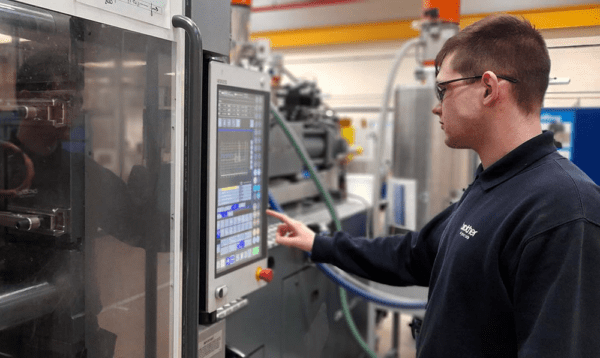
Matics Bridging the Skills Gap in Manufacturing
|
Getting your Trinity Audio player ready...
|
The manufacturing industry is facing a significant challenge as skilled workers age out of the workforce. The new generations entering the workforce have different needs and expectations, with a strong reliance on technology that contrasts sharply with the traditional methods used by their predecessors. As a result, manufacturers are struggling to bridge the skills gap and adapt to the demands of Industry 4.0.
To address this challenge, manufacturers are turning to advanced technologies designed to simplify processes and optimise productivity. These technologies have the potential to revolutionise the manufacturing industry. However, their success depends largely on their ease of use and the capabilities they offer to the workforce.
Matics, a digital platform designed for the manufacturing industry, helps simplify processes and boost productivity by providing a user-friendly interface that empowers frontline workers to make smarter decisions in real-time, optimising productivity and bridging the skills gap in a non-disruptive way.
Technology as a Partner to Human Workforce:
As the manufacturing industry evolves, it is becoming increasingly clear that technology should be seen as a complement to human workers, rather than a replacement. This is the future of Industry 4.0, and some even suggest that it may be the foundation of Industry 5.0.
To bridge the skills gap and drive Industry 4.0 forward, manufacturers need digital solutions that empower employees to make smarter decisions. These solutions must take into account the different needs of various stakeholders, such as operators and plant managers, and provide them with the tools and information they need to succeed.
Digital platforms designed for the shop floor help do this by providing different stakeholders with access to the data they need, in the format they need it, when they need it. By redistributing decision-ready insights to the relevant stakeholders, these solutions foster collaboration and ensure that everyone is working towards a common goal.
Matics complements human workers by providing real-time triggers and alerts and enabling process automation and communication directly via the Matics dashboard. Matics continually aggregates all shop floor data, including from information systems, sensors, and shop-floor workers, analyses that information, and delivers decision ready insights and call-to-actions to the relevant stakeholders.
Capturing Knowledge and Improving Transparency
Another key benefit of digital platforms is their ability to capture knowledge and improve transparency within the shop floor. Today, much of the information and communication that takes place within a manufacturing plant is lost due to siloed information, lack of a single source of truth, or the use of external applications that take knowledge outside the production context.
By integrating solutions that change this, all information is tagged and saved within the production context, making it easier to capture and store knowledge for future reference. This is particularly important when experienced workers retire, taking their valuable insights and expertise with them.
Matics makes it easy to capture this tribal knowledge, digitising best practices to guide new operators while allowing experienced staff to annotate improvements.
Upskilling Existing Team Members
Manufacturers shouldn’t overlook the value of their current workforce when it comes to bridging the skills gap. Upskilling is one of the best ways that manufacturers can invest in their existing workforce to see real improvements in their operations. As manufacturers continue to adopt new processes and technologies, providing their experienced team members with the necessary training and education ensures that they continue to deliver exceptional productivity.
Upskilling can take many forms, from overall training for roles throughout the workforce to the development of individuals to better leverage their unique skill sets.
By relying on employees who already understand key aspects of the operations, manufacturers can reduce the costs and time associated with onboarding while ensuring that their team has insight into the operations from multiple perspectives.
Reducing Manual Tasks Through Automation
In addition to developing a skilled workforce, automation also plays a vital role in alleviating the labour shortage. Connected factories make it easier to understand the big picture, streamline processes, react to critical events, and retain an agile operation. Digital platforms that connect to shop-floor machines, legacy systems and sensors can use that information to automate processes prone to human error, or reduce time wasted identifying events and alerting relevant stakeholders.
Implementing automation in the right way can reduce overall labour requirements, allowing different kinds of control, monitoring, and inspection to be handled without direct human intervention. While there is still a need for skilled operators and technicians, the overall labour requirement is greatly reduced.
Matics leverages automation to reduce manual tasks and optimise production processes thanks to real-time triggers and alerts when thresholds are breached, results do not match planned, or critical events occur, optimising productivity and alleviating the workload from the production floor teams.
Driving forward an Empowered Workforce
Bridging the skills gap in manufacturing requires a multi-faceted approach that leverages the power of digitalisation and automation while empowering the workforce to make smarter decisions. Digital solutions like Matics, which offer a user-friendly interface and real-time data access, can help capture knowledge, improve transparency, and foster collaboration on the shop floor.
By investing in upskilling existing team members and reducing manual tasks through automation, manufacturers can create a more agile and adaptable workforce that is well-equipped to meet the challenges of Industry 4.0. As the manufacturing industry continues to evolve, those who prioritise digitalisation and workforce development will be best positioned for success in the years to come.
To learn more about how Matics can help empower production teams to make smarter decisions in a non-disruptive and seamless way, book a free consultation with a Matics expert today!
Read more news from Matics here.
Matics
+44 (0) 1295 408725
Website
Email






